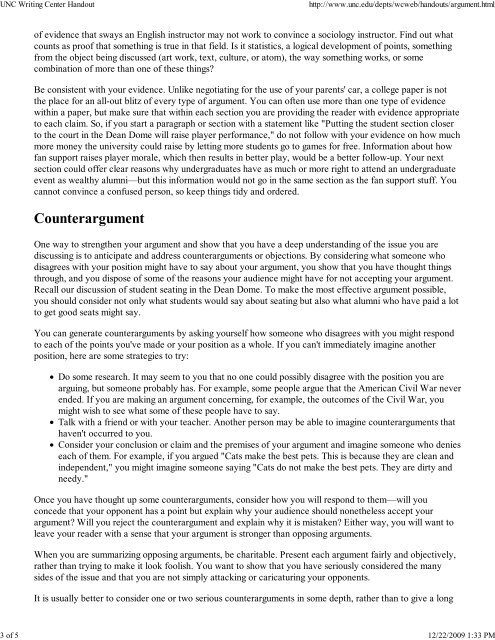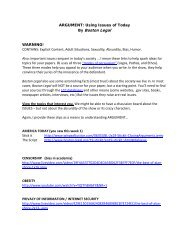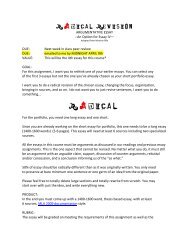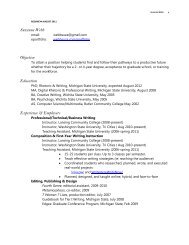UNC Writing Center Handout
UNC Writing Center Handout
UNC Writing Center Handout
You also want an ePaper? Increase the reach of your titles
YUMPU automatically turns print PDFs into web optimized ePapers that Google loves.
<strong>UNC</strong> <strong>Writing</strong> <strong>Center</strong> <strong>Handout</strong>http://www.unc.edu/depts/wcweb/handouts/argument.html3 of 5 12/22/2009 1:33 PMof evidence that sways an English instructor may not work to convince a sociology instructor. Find out whatcounts as proof that something is true in that field. Is it statistics, a logical development of points, somethingfrom the object being discussed (art work, text, culture, or atom), the way something works, or somecombination of more than one of these things?Be consistent with your evidence. Unlike negotiating for the use of your parents' car, a college paper is notthe place for an all-out blitz of every type of argument. You can often use more than one type of evidencewithin a paper, but make sure that within each section you are providing the reader with evidence appropriateto each claim. So, if you start a paragraph or section with a statement like "Putting the student section closerto the court in the Dean Dome will raise player performance," do not follow with your evidence on how muchmore money the university could raise by letting more students go to games for free. Information about howfan support raises player morale, which then results in better play, would be a better follow-up. Your nextsection could offer clear reasons why undergraduates have as much or more right to attend an undergraduateevent as wealthy alumni—but this information would not go in the same section as the fan support stuff. Youcannot convince a confused person, so keep things tidy and ordered.One way to strengthen your argument and show that you have a deep understanding of the issue you arediscussing is to anticipate and address counterarguments or objections. By considering what someone whodisagrees with your position might have to say about your argument, you show that you have thought thingsthrough, and you dispose of some of the reasons your audience might have for not accepting your argument.Recall our discussion of student seating in the Dean Dome. To make the most effective argument possible,you should consider not only what students would say about seating but also what alumni who have paid a lotto get good seats might say.You can generate counterarguments by asking yourself how someone who disagrees with you might respondto each of the points you've made or your position as a whole. If you can't immediately imagine anotherposition, here are some strategies to try:Do some research. It may seem to you that no one could possibly disagree with the position you arearguing, but someone probably has. For example, some people argue that the American Civil War neverended. If you are making an argument concerning, for example, the outcomes of the Civil War, youmight wish to see what some of these people have to say.Talk with a friend or with your teacher. Another person may be able to imagine counterarguments thathaven't occurred to you.Consider your conclusion or claim and the premises of your argument and imagine someone who denieseach of them. For example, if you argued "Cats make the best pets. This is because they are clean andindependent," you might imagine someone saying "Cats do not make the best pets. They are dirty andneedy."Once you have thought up some counterarguments, consider how you will respond to them—will youconcede that your opponent has a point but explain why your audience should nonetheless accept yourargument? Will you reject the counterargument and explain why it is mistaken? Either way, you will want toleave your reader with a sense that your argument is stronger than opposing arguments.When you are summarizing opposing arguments, be charitable. Present each argument fairly and objectively,rather than trying to make it look foolish. You want to show that you have seriously considered the manysides of the issue and that you are not simply attacking or caricaturing your opponents.It is usually better to consider one or two serious counterarguments in some depth, rather than to give a long








